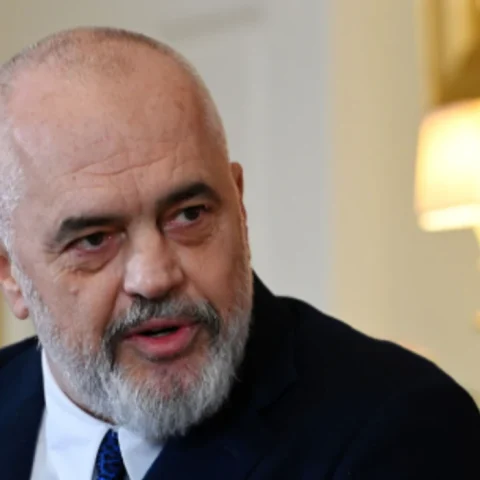The article below was first published on Feb. 26, 2020 in the Tirana Observatory. Many of the issues affecting the Albania-Kosovo relationship remain the same since then, albeit new issues have risen to add fuel to previous disagreements. It is part of a book authored by Albert Rakipi, “Albania and Kosovo – Is unification the common future”, an attempt to explain the historical context and today’s dynamics between the former motherland and today’s Kosovo as an independent state.
By ALBERT RAKIPI, PhD
The first visit to Tirana last week by Kosovo’s new Prime Minister, Albin Kurti, once again exposed the tensions in the Albania-Kosovo relationship, and the existence of disagreements about fundamental issues of co-operation between the two countries, as well as divergent points of view about regional co-operation. Just days after the leader of the Vetëvendosje Movement succeeded in forming a government following a difficult coalescence with the LDK, he decided to make Albania the destination of his first visit as Prime Minister.
Regardless of its symbolic character, the visit reconfirmed the poverty of the relationship between the two states: weak economic co-operation, poor trading exchange and, in consequence, the lack of reciprocal investments. Meanwhile, in confronting this reality the two Prime Ministers discovered another: more than seventy agreements signed between the two countries have either not been implemented at all, or only partially and for insubstantial topics. The Prime Ministers committed to establishing an inter-state commission to examine why these agreements are not functioning.
Twelve years after the proclamation of Kosovo as an independent state, relations with Albania progress slowly, without any great significance for the two and, moreover, with growing tensions.
First of all, why this state of affairs in their bilateral relations ? And a second, related question: how might a normal and strategic agenda be established between the two on the basis of which Albania and Kosovo equally could help one another? From the strategic perspective, the two countries foresee a future as independent, functioning states with developed economies and membership of the European Union.
There are at least two reasons for the distance from this goal, as well as for the political tensions between the countries. Firstly, Albania today continues to adopt a paternalistic and occasionally arrogant attitude towards Kosovo, one which was apparent again during the public appearance of the two premiers during Mr Kurti’s first visit to Tirana as head of Kosovo’s new government. Secondly, it has been noticeable that, in her relations with Serbia, Albania has undertaken to speak on behalf of Kosovo, to represent Kosovo and her institutions, to negotiate in Kosovo’s name, and even to mediate for her.
No one asked Albania to do this. On the contrary, senior leaders in Kosovo – initially in restrained terms and then increasingly openly and loudly – have demanded that Tirana should cease playing this paternalistic role. According to former Foreign Minister Enver Hoxhaj, ‘Albania cannot play the intermediary between Serbia and Kosovo because Albania has neither the strength nor the capacity for the role’. For Hoxhaj, it is the EU and USA who should mediate the relationship between Kosovo and Serbia. But this did not prevent the Albanian Prime Minister from pursuing his imaginary mission. From 2014 onwards, in every one of his meetings with the former Prime Minister and now President of Serbia, Vučić, Kosovo has been central – as if it were a matter between their two countries.
For well-known historical reasons, Albania has never played her role as mother-country. Much less has she been able to since 2008, when Kosovo became an independent state. Paradoxical as it may sound, it appears that Albania sees Kosovo as an Autonomous Province of hers.
This paternalistic attitude that forgets that Kosovo is an independent state has ensured that normal aspects of political co-operation – economic co-ordination, trading relations, and cultural, scientific and academic exchanges, and so forth – have dropped off the bilateral agenda.
The normal bilateral agenda between Albania and Kosovo has become constricted and hollowed out, because Albania wishes to play the chief role in Balkan reconciliation between Albanians and Serbs. Albania and Serbia, according to the former’s Prime Minister, should do as France and Germany have done with one another.
In fact, reconciliation between Albanians and Serbs in the region does not depend on Albania and Serbia, but on Kosovo and Serbia. This is the peace equation comparable to that of Germany and France. Albania’s insistence on making peace with Serbia in Kosovo’s name too obliged President Hashim Thaçi to declare publicly that ‘Peace between Albanians and Serbs comes from Prishtina, and not from Tirana’. The normal agenda has been further displaced by a false strategic agenda for the establishment of a Balkan peace according to the Schengen model.
Schengen as it has been implemented in the European Union is an idealistic and for now Utopian vision in the Balkans. Tirana flirts with the notion of western support for a Balkan mini-Schengen. She is very mistaken to make collaboration and relations with Kosovo conditional on a Balkan Schengen (if we take at face value Rama’s declaration that without the mini-Schengen there is no Albanian macro-Schengen). The West, whether the European Union or the United States, is not against co-operation between Albania and Kosovo.
Calls for the removal of the border between Albania and Kosovo are exercises in populism that serve more or less to obscure the true causes of the feeble relations between Albania and Kosovo. The ‘wars’ over potatoes, milk, flour or other things on the border between the two states are not because of the existence of the border, but because of politics: because of oligarchic, corrupt and indeed criminal interests.
It is time that Albania and Kosovo established a normal and indeed strategic agenda. But for this, it is first of all necessary for the Government and Prime Minister of Albania to cease using Kosovo as a proxy for their own interests, in two ways. Firstly, this aims to buy support in the west by exploiting Kosovo, appearing as one of the most important – if not the most important – players in the Kosovo-Serbia relationship. Second, the proxy game played by Albania, or in truth by her Prime Minister, has the aim of promoting his leadership in the region, quite unnecessarily, implausibly, and uselessly.
Thus the Albanian Prime Minister’s activism on behalf of the so-called mini-Schengen has the function of buying western support, with the idea of presenting a reforming leader contributing to peace in the region by means of the Schengen brand – something that no one can criticize in principle. But this leader, working for an ideal world through his Schengen in the Balkans, has in his six years in power gone from zero problems with the neighbours, ( a thesis borrowed from Turkish Foreign Minister Ahmet Davutoğlu ) which he promised in 2013, to problems with all the neighbours unfortunately including Kosovo, while in her domestic politics Albania has achieved one-party elections and a one-colour parliament.
Even when it comes to Serbia, with whom it might be thought that relations are good and progressing, the truth is that they are characterized as the status quo. That is especially the case if the joint Belgrade-Tirana initiative for peace and a mini-Schengen zone in the region is not considered as a positive result of their relationship. If Serbia were interested in fostering peace, including through the Schengen zone or formula, the first step should be to cease her campaign against recognitions of the Republic of Kosovo, and to recognize her travel documents and passports, as some other non-recognizing states have done.
A normal agenda between Albania and Kosovo would pre-suppose the development, operation and reinforcement of their inter-state relations, currently nearly at crisis point, before the development of a Balkan Schengen.
Kosovo has a new government and new prime minister, who before he came to power upheld the idea that national unification is a sine qua non for the development and progress of Albania and Kosovo. National Unification has been the currency of Mr Kurti’s political ideology, but it remains to be seen how it will be absorbed. In any case, Kurti is right to say that before we address the Balkan Schengen we should address the Albanian macro-Schengen, meaning in particular the co-ordination and the intensification of political, economic and every other kind of relations between Albania and Kosovo – as always, two independent states.










